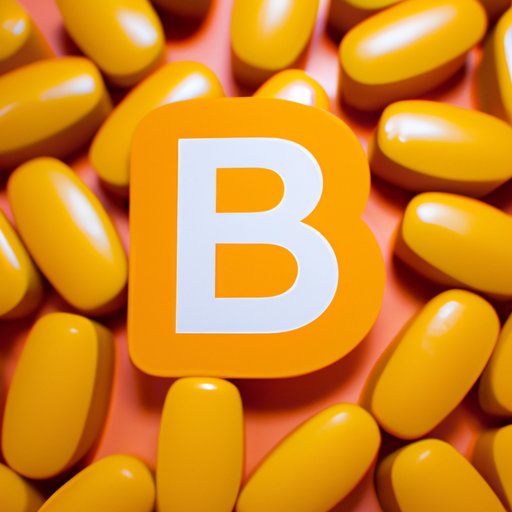Introduction
Have you ever wondered what exactly Vitamin B is and why it’s important for your health? Vitamin B is a group of essential nutrients that play a crucial role in our overall health and well-being. From helping to convert food into energy, to promoting healthy skin, hair, and nails, Vitamin B serves a variety of functions within our bodies. In this comprehensive guide, we’ll explore everything you need to know about Vitamin B, including its importance, functions, different types, dietary sources, and potential deficiency risks.
Importance and Functions of Vitamin B: An In-depth Guide
Before diving into the different types of Vitamin B, it’s important to understand its overall importance and functions in our bodies. Vitamin B serves a crucial role in helping our bodies convert food into energy, maintain a healthy nervous system, and produce red blood cells. Additionally, it helps to support healthy skin, hair, and nails, and can even play a role in improving mood and cognitive function.
Vitamin B1 (Thiamine)
Vitamin B1, also known as thiamine, is essential for converting carbohydrates into energy and is necessary for a healthy nervous system.
Vitamin B2 (Riboflavin)
Vitamin B2, also known as riboflavin, helps to break down carbohydrates, proteins, and fats for energy production and is crucial for maintaining healthy skin, eyes, and nervous system.
Vitamin B3 (Niacin)
Vitamin B3, also known as niacin, helps to maintain healthy skin, nerves, and digestion, and can also lower cholesterol levels.
Vitamin B5 (Pantothenic acid)
Vitamin B5, also known as pantothenic acid, is necessary for the production of hormones, cholesterol, and red blood cells, and can also support healthy skin and hair.
Vitamin B6 (Pyridoxine)
Vitamin B6, also known as pyridoxine, is important for brain development and function, mood regulation, and the production of hemoglobin, which helps to carry oxygen in the blood.
Vitamin B7 (Biotin)
Vitamin B7, also known as biotin, is necessary for healthy skin, hair, and nails, and plays a role in carbohydrate, fat, and protein metabolism.
Vitamin B9 (Folate)
Vitamin B9, also known as folate or folic acid, is important for cell growth and development, including during pregnancy, and can also help to prevent some birth defects.
Vitamin B12 (Cobalamin)
Vitamin B12, also known as cobalamin, is necessary for the formation of red blood cells and DNA, and can also support healthy nerves and brain function.
Exploring the Different Types of Vitamin B: Which Ones are Essential for Your Health?
While all of the different types of Vitamin B offer important benefits and functions, there are a few that are considered essential for our overall health. These essential B vitamins include thiamine (B1), riboflavin (B2), niacin (B3), pantothenic acid (B5), pyridoxine (B6), biotin (B7), folate (B9), and cobalamin (B12).
Vitamin B in Your Diet: A Guide to Achieving a Balanced Intake
Now that we’ve explored the importance and functions of Vitamin B, it’s important to understand how we can incorporate it into our diet. Vitamin B can be found in a variety of foods, including meat, fish, eggs, dairy, whole grains, leafy green vegetables, and some fruits. For optimal Vitamin B intake, it’s important to incorporate a variety of these foods into your diet, and in some cases, consider taking a Vitamin B supplement. The recommended daily intake of each B vitamin varies, but generally ranges from 1.1-2.4 mg for adults.
Vitamin B and Mental Health: How this Vitamin can Affect Mood and Cognitive Function
Research has shown a connection between Vitamin B and mental health, particularly in regards to improving mood and cognitive function. Vitamin B6, for example, has been shown to help regulate mood and reduce symptoms of depression, while Vitamin B12 can support healthy brain function and decrease the risk of cognitive decline.
A Comprehensive Look at Vitamin B Deficiency: Understanding the Risks and Warning Signs
While it’s important to incorporate enough Vitamin B into our diets, it’s also crucial to understand the risks and warning signs of Vitamin B deficiency. Causes of deficiency can include poor dietary intake, malabsorption disorders, certain medications, and alcoholism. Symptoms of deficiency may include fatigue, weakness, anemia, tingling or numbness in the hands and feet, and impaired cognitive function. Certain groups of people, such as pregnant women and older adults, may be more at risk for Vitamin B deficiency. If you suspect you may have a deficiency, it’s important to speak with your healthcare provider and consider getting your Vitamin B levels checked.
Vitamin B and Energy: How this Vitamin Helps Your Body Convert Food into Fuel
Vitamin B plays a crucial role in energy production within our bodies, helping to convert food into fuel that our bodies can use. Specifically, several B vitamins, including thiamine (B1), riboflavin (B2), niacin (B3), pantothenic acid (B5), and pyridoxine (B6) are involved in the process of breaking down carbohydrates, proteins, and fats for energy.
The Benefits of Vitamin B for Skin, Hair, and Nails: A Guide to Healthy Beauty
In addition to its internal benefits, Vitamin B can also promote healthy skin, hair, and nails. Biotin (B7) is particularly beneficial for maintaining strong, healthy hair and nails, while several other B vitamins, including riboflavin (B2), niacin (B3), and pantothenic acid (B5) can help to promote healthy skin.
Conclusion
In summary, Vitamin B is a crucial group of nutrients that offer a wide variety of health benefits, including energy production, nervous system support, and healthy skin, hair, and nails. By incorporating foods rich in Vitamin B into your diet, you can support your overall health and well-being. If you suspect you may have a Vitamin B deficiency or have questions about incorporating adequate amounts of this nutrient into your diet, speak with your healthcare provider.
